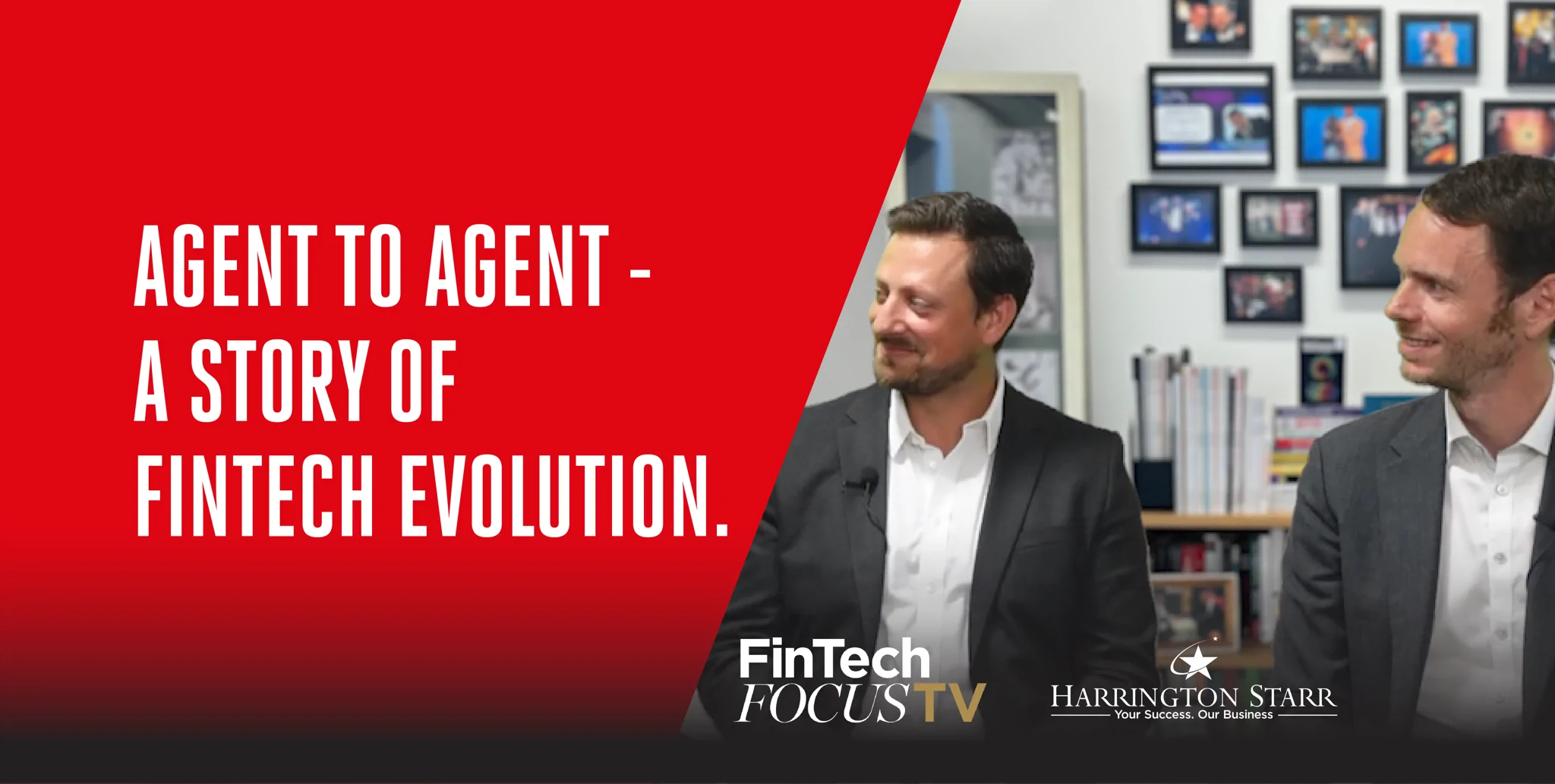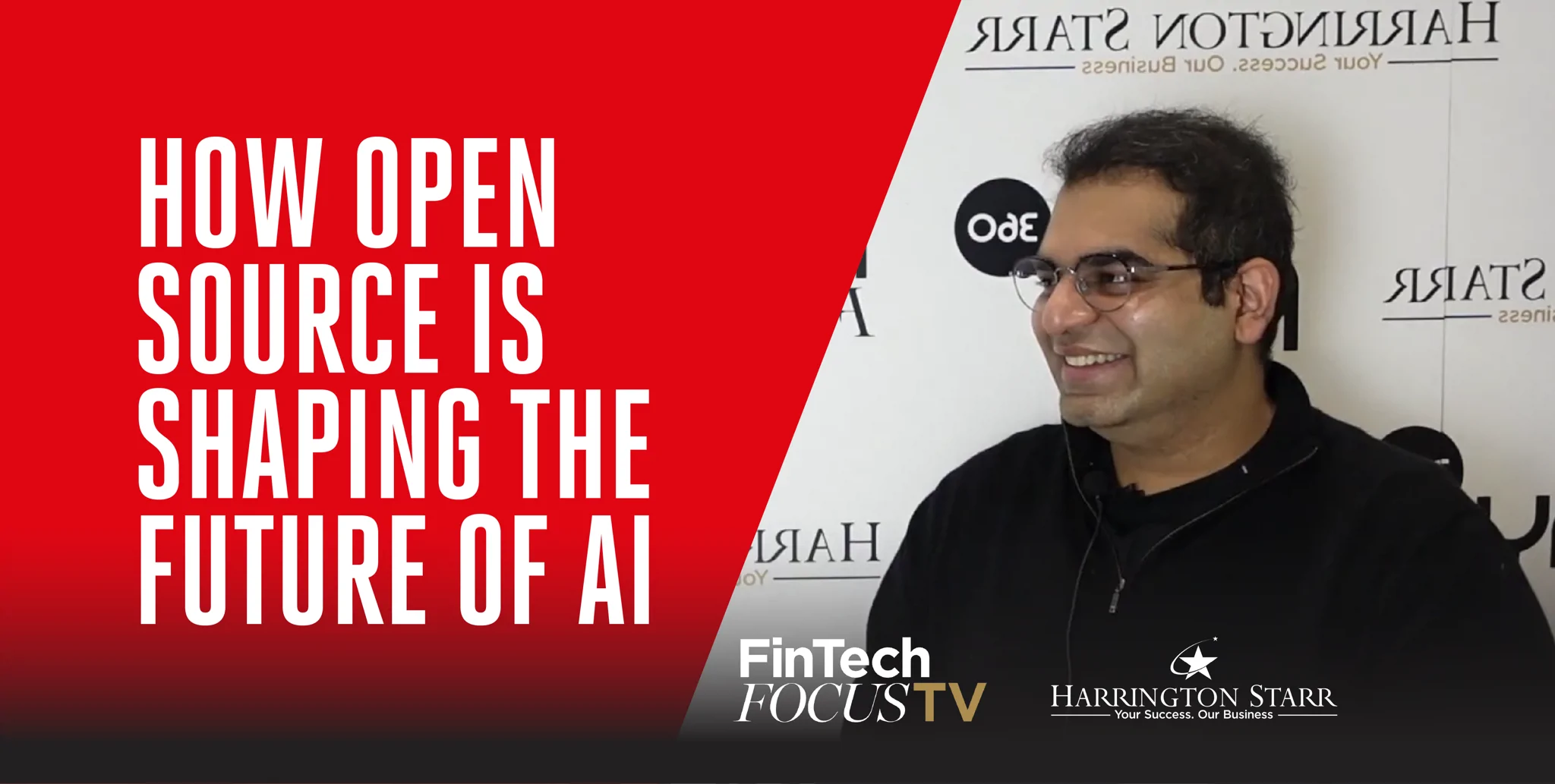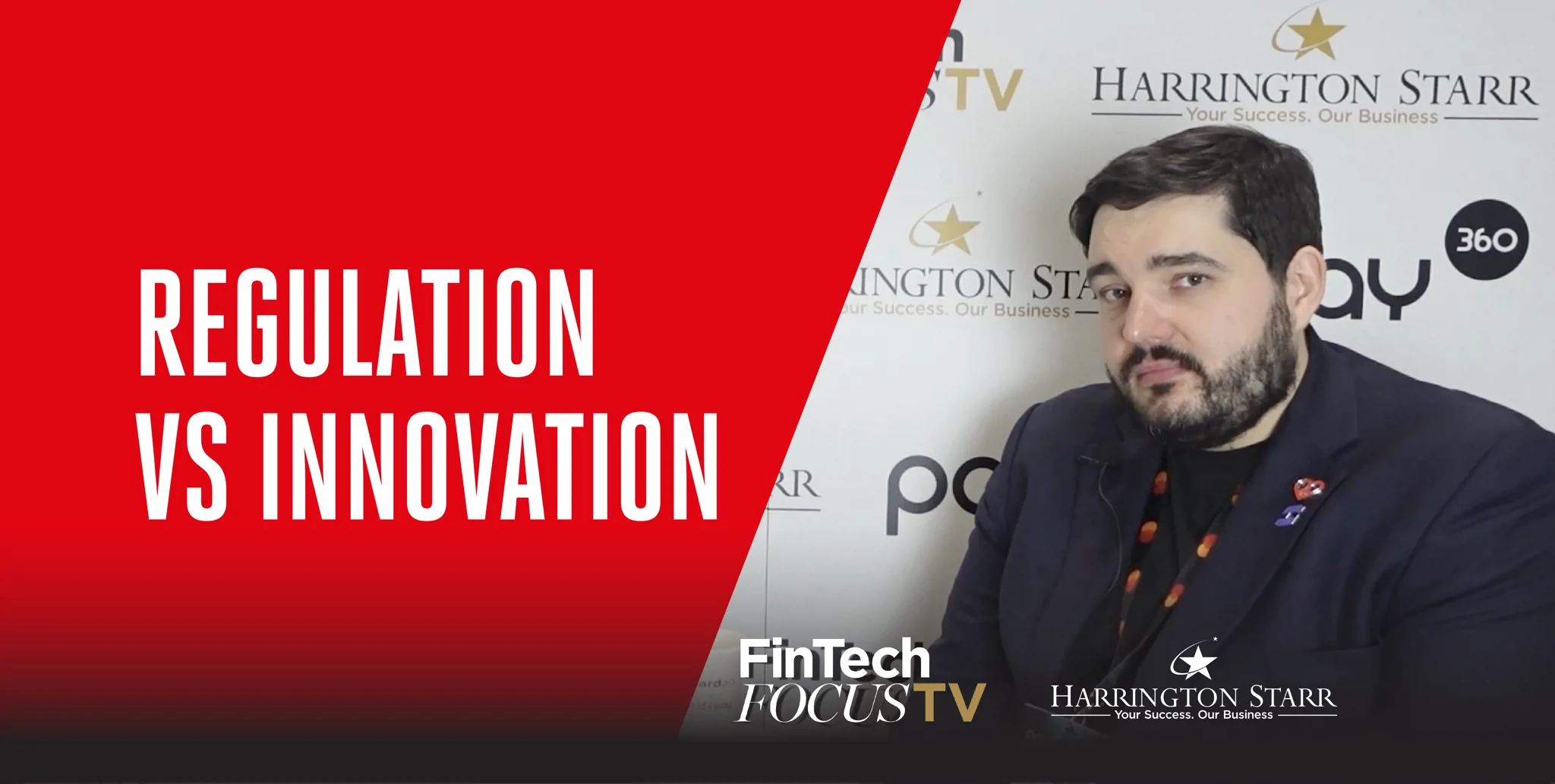
Open Source AI and FinTech Innovation
The pace of transformation within the FinTech industry continues to accelerate, fuelled by the growth of generative artificial intelligence (AI) and the broader democratisation of technology. As part of the special FinTech Focus TV series recorded at PAY360 2025, Ian Bailey sat down with Prajval Dsilva, VP Growth at Allica Bank, for an insightful conversation on the implications of open-source AI models, the regulatory frameworks shaping the future, and the ethical considerations that must underpin innovation in financial services.
For Harrington Starr, a leading FinTech recruitment business, this episode underscores the growing demand for professionals who can drive intelligent adoption of AI technologies while balancing risk, compliance, and customer-centricity.
FinTech Recruitment Is Being Reshaped by Open Source AI
Prajval begins the conversation by highlighting the immense promise of open-source AI in FinTech. Traditional AI models—especially proprietary and closed systems—often come with high licensing costs and limited transparency. By contrast, open-source models are freely accessible, editable, and often more flexible in deployment.
For Allica Bank, which focuses on serving small and medium-sized enterprises (SMEs), the adoption of generative AI powered by open-source technologies offers the potential to revolutionise operations. From automating manual document handling and streamlining onboarding processes to enhancing customer engagement with personalised insights, the benefits are manifold.
This development has a direct impact on FinTech recruitment. The rise of open-source frameworks is leading to a new hiring demand: technology leaders who understand not only software development, but also machine learning principles, ethical design, and data governance. FinTech firms are increasingly seeking individuals with hybrid skill sets to guide responsible AI integration into scalable platforms.
Driving Inclusion and Accessibility Through FinTech AI
In the UK, SMEs represent a critical segment of the economy—yet many continue to be underserved by legacy banks. Prajval speaks passionately about Allica Bank’s mission to bridge this gap, using technology to create financial products that are inclusive, efficient, and relevant.
Accessibility is at the heart of this mission. Prajval draws attention to how closed AI models can inadvertently widen digital inequality by limiting access to powerful tools to only the wealthiest corporations. On the other hand, open-source AI enables smaller organisations and startups to benefit from cutting-edge capabilities without the prohibitive costs.
This democratisation of technology has strong implications for FinTech hiring trends. There’s a growing need for data scientists, product managers, and compliance specialists who can implement inclusive technologies. At Harrington Starr, we see a clear uptick in client demand for candidates who are not just technically skilled, but also socially and ethically aware.
Navigating Regulation and Risk in FinTech AI Deployment
A central part of the discussion revolves around regulation—an increasingly critical area as financial institutions explore the adoption of generative AI. Prajval explains that while open-source AI offers speed and flexibility, it also comes with serious risks that must be understood and mitigated. For example, generative models can hallucinate, or produce false outputs, which is a major concern in a regulated environment like financial services.
Moreover, there are legal considerations regarding the datasets used to train AI models. If copyrighted content has been ingested without proper permissions, companies using those models could be exposed to litigation or regulatory scrutiny. For FinTech companies, this risk is non-trivial.
To navigate this landscape effectively, companies need to employ governance frameworks, audit trails, and responsible data practices. Allica Bank, for instance, uses Retrieval-Augmented Generation (RAG) methods to ensure that outputs are grounded in verifiable internal data rather than uncontrolled internet content. This allows the bank to utilise AI-generated insights while maintaining a high degree of trust and accuracy.
These challenges underscore a growing trend in FinTech hiring: the demand for professionals who can marry technology with governance. AI compliance officers, risk analysts with AI expertise, and technologists trained in legal and ethical AI design are becoming invaluable to modern financial institutions.
Why Transparent and Explainable AI Is Essential in Financial Services
One of the biggest barriers to AI adoption in FinTech is the “black box” nature of many models. Prajval explains that institutions can’t use tools they don’t understand—especially when they are making decisions that affect customers’ financial lives. Whether it's approving a loan, flagging fraudulent activity, or predicting market trends, financial services firms need to explain how their AI models arrive at specific conclusions.
This is not just a regulatory requirement; it is a trust requirement. Customers demand to know how decisions are being made, especially when those decisions have significant consequences. In an industry built on credibility and integrity, a lack of explainability can erode trust and damage brand reputation.
Open-source AI can be part of the solution. Unlike closed models, open-source systems can be examined, audited, and adjusted internally. FinTech companies can understand the mechanisms of model behaviour, ensure alignment with regulatory expectations, and improve the accuracy and reliability of AI outcomes.
This need for transparency is creating exciting opportunities in FinTech recruitment. There’s a growing demand for explainability experts, model validators, and professionals with experience in interpretability tools. At Harrington Starr, we’re working with clients across London, Belfast, and New York to identify and place this next generation of talent.
Building a Collaborative Ecosystem for AI in FinTech
Prajval offers a compelling vision for the future: an open-source AI ecosystem driven not just by competition, but by collaboration. In his view, the financial services sector has a unique opportunity to set the standard for responsible AI. By working together—across institutions, regulators, technologists, and academic researchers—the FinTech community can shape a landscape that is both innovative and equitable.
This vision includes collective investment in AI research, shared governance models, and open communication about what works and what doesn’t. Prajval emphasises that the stakes are too high for financial institutions to operate in silos. The complexity of AI requires a community approach, and FinTech leaders have the potential to catalyse this change.
This culture of collaboration aligns strongly with Harrington Starr’s approach to FinTech recruitment. We don’t just match candidates to jobs—we help businesses build connected, forward-thinking teams. Our clients are not just looking for coders; they’re looking for collaborators, communicators, and culture-builders who can lead in this new era of AI-driven finance.
The Strategic Advantage of Open Source AI for FinTech Growth
As Prajval concludes, he reiterates a key point: the future of FinTech will be shaped by how organisations leverage open-source AI to create scalable, compliant, and ethical products. The use of generative models will become increasingly embedded in core business functions—not just as back-end tools, but as front-line capabilities that directly shape customer experience.
The real competitive advantage lies not just in having access to AI, but in deploying it responsibly and effectively. FinTech firms that can master this integration will outperform their peers—not only in operational efficiency, but also in trust, agility, and innovation.
From a recruitment perspective, this means that FinTech companies must evolve their talent strategies. It is no longer enough to hire for technical roles in isolation. Companies must build cross-functional teams that bring together engineering, data, compliance, marketing, and customer experience. Harrington Starr is proud to support clients in doing exactly that—connecting them with talent that accelerates both growth and governance.
What FinTech Companies Can Learn from Allica Bank’s AI Journey
Throughout the conversation, Allica Bank emerges as a blueprint for FinTech companies looking to adopt AI the right way. By focusing on SMEs, using open-source tools, and maintaining a high bar for compliance, the bank illustrates how innovation and responsibility can go hand in hand.
Their use of RAG methods, their attention to explainability, and their commitment to customer-centric design offer practical lessons for other FinTechs navigating this space. Importantly, they demonstrate that open-source AI isn’t just a cost-saving tool—it’s a strategic enabler of long-term growth and customer trust.
For other FinTechs looking to replicate this success, the first step is building the right team. That means recruiting not just for current needs, but for future readiness. Harrington Starr helps companies plan for this by identifying professionals who bring both domain expertise and a vision for what’s next.
Conclusion: The FinTech Workforce Behind Ethical AI Transformation
This episode of FinTech Focus TV, recorded at PAY360 2025, stands as an essential watch for anyone navigating the evolving relationship between AI and financial services. Through the thoughtful insights of Prajval Dsilva and the sharp hosting of Ian Bailey, viewers gain a clearer understanding of the real challenges and opportunities ahead.
The discussion affirms a fundamental truth: technology alone does not create innovation. People do. Ethical, transparent, and impactful AI depends on the professionals who build it, deploy it, and hold it accountable. This is where FinTech recruitment becomes business-critical.
At Harrington Starr, we are proud to play our part in shaping this future. Whether you are a FinTech leader looking to scale your AI initiatives, or a technologist seeking to make a real impact in financial services, we are here to connect you with the right opportunities and people.
Harrington Starr is a leading FinTech recruitment business with offices in London, Belfast, and New York, specialising in connecting exceptional talent with the most innovative companies across the global financial technology landscape. Since 2010, we’ve partnered with startups, scale-ups, and enterprise-level organisations to provide permanent and contract staffing solutions across software engineering, data, infrastructure, cloud, quantitative finance, product management, sales, marketing, and more. Our commitment to quality, integrity, and industry expertise has made us the go-to talent partner for FinTech businesses seeking to scale effectively, remain competitive, and navigate periods of transformation. Through award-winning content, market intelligence, and purpose-led campaigns, we help shape the future of FinTech—one hire at a time.





